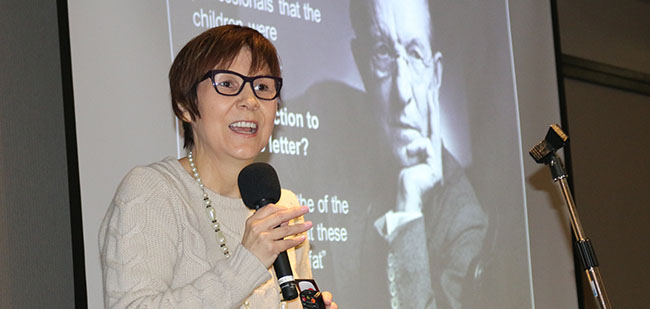‘This is a great victory for our kids’: Madahbee

UOI OFFICES (Nipissing FN) January 29, 2016 – Anishinabek Nation Grand Council Chief Patrick Madahbee and Deputy Grand Council Chief Glen Hare welcome the Canadian Human Rights Tribunal Child Welfare decision.
“The federal government has avoided the truth for many years,” says Grand Council Chief Madahbee. “Over 170 cases and millions and millions of dollars have been wasted fighting First Nations and getting beat every time. This is a great victory for our kids.”
Madahbee also commends Cindy Blackstock – Executive Director of the Caring Society – and says she’s a real hero. “Cindy didn’t do this for any glory,” says Madahbee.
Deputy Grand Council Chief Glen Hare says that the Anishinabek Nation is hopeful that the Federal government will work with First Nation and the Province of Ontario to ensure that First Nations children and families will be provided with enhanced prevention supports regardless of where they live.
“The Anishinabek Nation will work with the Province and the Federal government to enact the Anishinabek Child Well-Being Law by April 1, 2017,” says Hare. “The Anishinabek Nation is on a path to exercise our inherent jurisdiction in Child Welfare. We are developing culturally-appropriate child welfare tools and assessments for the Anishinabek Nation Child Well-Being Law implementation.”
Union of Ontario Indians Social Services Director Adrienne Pelletier says that we need to go back to the original, national version of Jordan’s Principle.
“Even though it was passed in the House of Commons in 2007, neither the Federal government nor the Provinces have fully-implemented Jordan’s Principle,” says Pelletier. “If a First Nation’s child gets sick in another province, we need their healthcare fully covered, and the province and feds can deal with who is paying for what later.”
Payment disputes within and between Federal and Provincial governments over services for First Nations children are not uncommon. First Nations children are frequently left waiting for services they desperately need, or are denied services that are available to other children. This includes services in education, health, childcare, recreation, and culture and language. Jordan’s Principle calls on the government of first contact to pay for the services and seek reimbursement later so the child does not get tragically caught in the middle of government red tape.
Background:
In February of 2007 the First Nations Child and Family Caring Society and the Assembly of First Nations (AFN) filed a complaint alleging that the Department of Indian and Northern Affairs provision of First Nations child and family services was flawed, inequitable and thus discriminatory under the Canadian Human Rights Act.
Indigenous and Northern Affairs Canada (INAC) requires First Nations child and family service agencies to operate pursuant to provincial/territorial child welfare laws, the federal government controls the nature and extent of child welfare delivery on reserve through a variety of policies, programs and funding regimes. Internal INAC reviews and Auditor General of Canada reports (2008, 2011) have repeatedly found INAC’s flawed and inequitable approaches contribute to growing numbers of First Nations children in child welfare care. The complaint was filed in the best interests of First Nations children after INAC failed to implement two solutions it jointly developed with First Nations.
The Tribunal began hearing the evidence on February 25, 2013 and heard from 25 witness testifies on May 30, 2014 and approximately 500 documents were filed as evidence. This case will set an important precedent for addressing inequitable Federal Government service delivery to First Nations peoples in other areas such as education, health, housing, and water.

